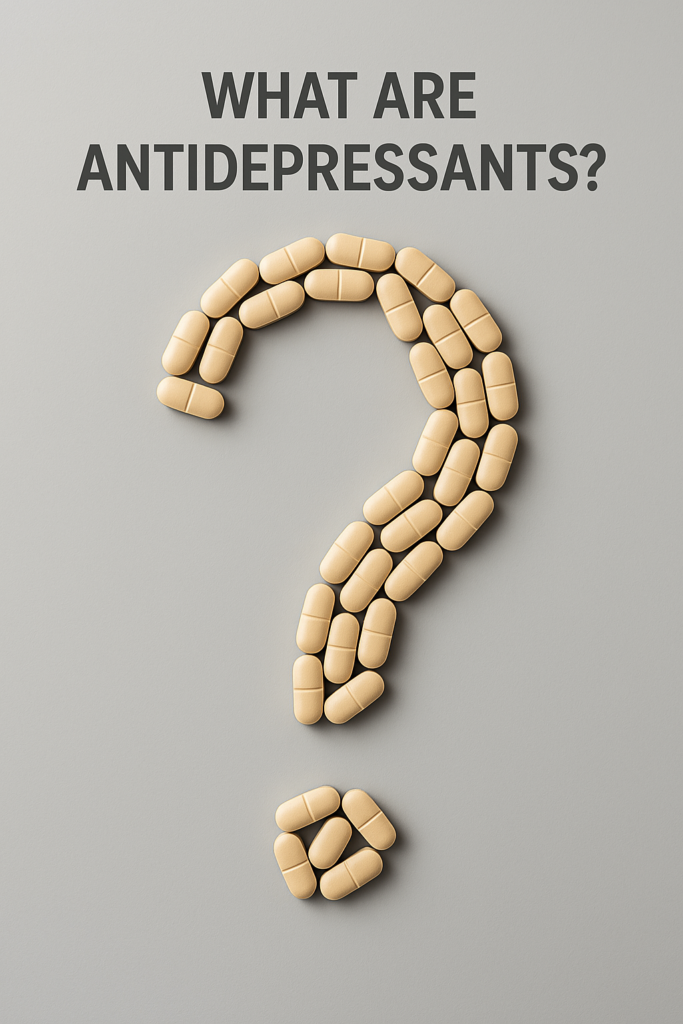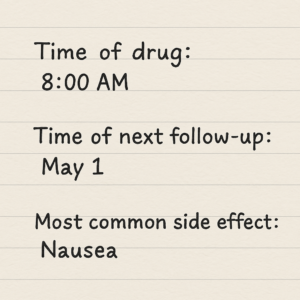Types of Antidepressants and How They Work: A Step-by-Step Guide

People’s ideas about antidepressants reflect a particular fear and stigma. In fact, when many people hear the word ” antidepressant, ” they often think of someone mad.
But what if I told you that types of antidepressants are the most commonly prescribed drugs in the United States? What if I told you that one in ten United States citizens takes antidepressants?
This fear emerges from the belief that antidepressants work on the nerve cells of our brain, which creates an idea that there is something wrong with the brain. However, the truth is that antidepressants act on specific receptors in the brain.
The nerve cells in our brain use various chemicals to transmit signals. These chemicals aid in creating connections and communicating between nerve cells, which ultimately determine how you feel, eat, sleep, and act.
In depression, the level of these chemicals is low, which creates a barrier in nerve cell communication and results in depressive symptoms. Here is the role of antidepressants, which make the level of these chemicals available to facilitate communication.
Here is a step-by-step guide to understanding antidepressants, types of antidepressants, the mechanisms of each type, and some useful information for better outcomes.
Step 1: What Are Antidepressants?
Antidepressants are medications that work by altering brain neurotransmitters to decrease or stop the symptoms of depression and other mental health issues, including anxiety disorders, obsessive-compulsive disorder (OCD), and post-traumatic stress disorder (PTSD).
An important aspect to consider is that these drugs take time to produce effects due to the interplay of neurotransmitters; thus, they work gradually to stabilize your mood rather than instantly make you happy.
Additionally, the effectiveness of antidepressants may vary from person to person, just as symptoms can differ. Therefore, follow-up is essential for determining the best drugs for you or if an adjustment or alternative medication is needed.

Step 2: Types of Antidepressants
There are many classes of antidepressants; here are the most common, with a brief summary of their mechanisms. Later, we will delve into each one individually.
- Selective Serotonin Reuptake Inhibitors (SSRIs): Increase serotonin levels.
- Serotonin-norepinephrine reuptake Inhibitors (SNRIs): Increases serotonin and norepinephrine.
- Tricyclic Antidepressants (TCAs) : These work the Same way as SNRIs.
- Monoamine Oxidase Inhibitors (MAOIs) : Inhibit monoamine oxidase enzymes that degrade specific neurotransmitters.
Step 3: How Do Antidepressants Work in the Brain?
Most increase or stabilize the levels of these neurotransmitters, particularly serotonin, dopamine, and norepinephrine. You can think of it as “turning up the volume” on positive neural signals, helping to alleviate symptoms that can enhance mood and emotional regulation.
Below is a breakdown of each type and its mechanism:
Selective Serotonin Reuptake Inhibitors (SSRIs) work by decreasing serotonin reabsorption into neurons, thus increasing the level of serotonin.
Serotonin-norepinephrine reuptake Inhibitors (SNRIs): These drugs have the exact mechanism of action as SSRIs, but they also work on serotonin and norepinephrine, making them helpful not just for mood but also for focus, energy, and even chronic pain.
Tricyclic Antidepressants (TCAs): An older class that affects various neurotransmitters. They are effective but less commonly used today due to the higher risk of side effects compared to newer antidepressants like SSRIs and SNRIs.
Monoamine Oxidase Inhibitors (MAOIs) work by inhibiting monoamine oxidase, an enzyme that breaks down neurotransmitters like serotonin and norepinephrine. Thus, they increase the availability of these neurotransmitters, enhancing mood and emotional well-being. However, they are limited due to their interaction with certain foods and medications.
Step 4: Why Use Antidepressants if the Root Cause Isn’t Treated?
You may wonder why we use antidepressants if the root cause isn’t treated.
Well, they are effective in treating the symptoms, which could be beneficial in specific cases such as trauma, chronic stress, and chronic illness.
Additionally, they create space for healing and life changes. People with depression are usually unmotivated, and this medication helps them lift the emotional fog, improve sleep, appetite, and focus, and, most importantly, allow therapy, lifestyle changes, or problem-solving to work.
Additionally, depression may arise from biological factors such as genetics, brain chemistry, chronic inflammation, or hormonal changes. This makes antidepressants suitable for preventing complications and alleviating symptoms.
Whatever the cause, medication plays a significant role in addressing at least part of the root cause or regulating the system while further support is provided.
Step 5: How Long Will Antidepressants Start Working?
An important aspect to address during treatment courses is the outcome over a while and how the effect of these drugs appears physically and psychologically.
We understand how differences in the neurotransmitter manifest physically and physiologically, so it will be easy to understand what to expect from treatment. However, remember that responses may vary from person to person, and the time frame may also vary.
In the first two weeks, physical symptoms such as sleep, appetite, and fatigue may begin to improve. These changes are the first indicators of whether the drug is working.
You may notice mood improvements during the following two weeks; however, significant mood and emotional well-being changes often take longer to manifest.
Finally, the full therapeutic effects usually take about 6 to 8 weeks to achieve the maximum benefit of these drugs for mood enhancement and increased motivation.
While this timeframe is ideal, it may vary between individuals and depend on the status of the condition.
Step 6: Managing Side Effects and Staying Consistent

Creat tracing note:
It’s essential to stay consistent with your medication regimen and manage to determine progress and side effects. Establishing a routine for taking your medication at specific times can help you stay on track. Making notes about side effects would be valuable for you and your healthcare provider.
Regular Follow-ups:
It’s also important to remain patient and attend regular follow-up appointments. People’s responses to medication can vary, and doctors may need to adjust or change your medicines based on your experience.
Step 7: Be Patient and Stay Optimistic
Recovery takes time. You can seek help with antidepressants and medical care, but you also need to take essential actions. Consistency, a shift in mindset toward a more optimistic outlook, and lifestyle changes are all essential parts of the process.
Interestingly, a study investigating the effectiveness of antidepressants found that 50 out of 100 participants noticed an improvement in their symptoms within six to eight weeks. You might wonder about the other half. Many factors can influence outcomes, including genetics. However, genetics is not the only cause of depression. It is also possible that the wrong medication type was prescribed, the treatment strategy needs adjustment, or that collaboration with the healthcare provider could be improved.
While antidepressants can help manage symptoms, they work most effectively when combined with therapy, lifestyle changes, and a supportive network. Trust your healthcare provider, and remember that progress may be gradual, but it is still a positive sign.
Antidepressants are effective in treating depression and other mental health issues. They primarily address symptoms that result from imbalances in certain neurotransmitters. By restoring a normal balance, depression may gradually diminish.
Being patient and consistent with regular follow-ups and lifestyle changes is essential. Progress takes time and can vary from person to person, so it is crucial to adhere to your doctor’s guidance.
Consider your mental health provider a friend, and feel free to express your thoughts and feelings to them as you work through challenges.
Remember, there is a solution to every problem; keep moving forward and trust that your healthcare provider can make a difference. Stay optimistic, and be aware that progress often takes time.

Reference
Centers for Disease Control and Prevention (CDC). (n.d.). National Health and Nutrition Examination Survey (NHANES). https://www.cdc.gov/nchs/nhanes/index.htm?CDC_AA_refVal=https%3A%2F%2Fwww.cdc.gov%2Fnchs%2Fnhanes.htm
National Center for Biotechnology Information. (n.d.). Mental health: Medications (i2143). In PubMed Health. https://www.ncbi.nlm.nih.gov/books/n/pmh_iqwig/i2143/
National Center for Biotechnology Information. (n.d.). Mental health: Medications (i2247). In PubMed Health. https://www.ncbi.nlm.nih.gov/books/n/pmh_iqwig/i2247/
National Center for Biotechnology Information. (2016). Mental health and medications. In PubMed Health. https://www.ncbi.nlm.nih.gov/books/NBK361016/?utm_source=chatgpt.com
Mayo Clinic. (2022). Antidepressants: Get the facts on types and side effects. https://www.mayoclinic.org/diseases-conditions/depression/in-depth/antidepressants/art-20046983?utm_source=chatgpt.com
National Institute of Mental Health (NIMH). (n.d.). Mental health medications. https://www.nimh.nih.gov/health/topics/mental-health-medications
Mayo Clinic. (2022). Antidepressants: Get the facts on types and side effects. https://www.mayoclinic.org/diseases-conditions/depression/in-depth/antidepressants/art-20046983?utm_source=chatgpt.com
National Center for Biotechnology Information. (n.d.). Antidepressants. In PubMed Health. https://www.ncbi.nlm.nih.gov/books/NBK539848/
National Center for Biotechnology Information. (n.d.). Antidepressants. In PubMed Health. https://www.ncbi.nlm.nih.gov/books/NBK539848/
National Institute of Mental Health (NIMH). (n.d.). Mental health medications. https://www.nimh.nih.gov/health/topics/mental-health-medications
National Institute of Mental Health (NIMH). (n.d.). Mental health medications. https://www.nimh.nih.gov/health/topics/mental-health-medications
National Center for Biotechnology Information. (2016). Mental health and medications. In PubMed Health. https://www.ncbi.nlm.nih.gov/books/NBK361016/?utm_source=chatgpt.com
